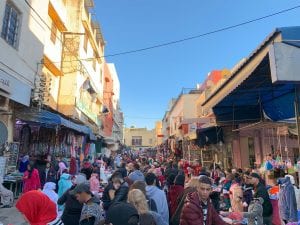Labas? Labas L'Hamdulillah!
How are you? Good, Praise be to God!
It was an exchange I made with almost every Moroccan on the street. Whether it was my host dad, my professors, or my hanout guy, it wasn't uncommon to say L'Hamdulillah after almost every greeting. At first I felt like I was appropriating a culture, a culture that I was new to. I was a foreigner still, with a target on my back for all the merchants and vendors to try and scam me out of a few Dirham. But I was assured by almost everyone in Morocco that speaking Diriga (their country's dialect of Arabic) was necessary if I truly desired complete immersion and inclusivity. Everyone says l'Hamdulillah proudly because it ties together a love for country, Islam, and family. After I sneeze. l'Hamdulillah! The food was amazing. l'Hamdulillah. Barça beat Real. l'Hamdulillah!
l'Hamdullilah! l'Hamdulillah! l'Hamdulillah! I loved the phrase. Taxi drivers would chuckle to themselves and politely say it back. My hanout guy would spread his arms out wide and shout it to the skies whenever he saw me. Two Dirhams for a Snickers. "Everything in Morocco is so cheap," I would say, "l'Hamdulillah!" Everyone praised God because there was so much to be thankful for. Healthy families, good weather, and cheap foods. As a student from the States, Morocco seemed too good to be true. My first week in the country was otherworldly, l'Hamdulillah! Only, it took the novelty to wear off for me to realize that not everything was good food and colorful markets. My daily walk to the IES Center took me through the markets of the old Medina. Day in and day out I would make the thirty minute walk, breathing in salted cod and drying clay. The sights of the colored scarves in storefronts dancing in the wind, and the banners of makeshift umbrellas reflecting vibrant colors over the sandy paths made for a distracting spectacle. So distracting that I never noticed those in the shadows, tucked away behind the crowds of people hoping for a few Dirhams to be tossed their way. If everything was so cheap then why were people so hungry. If you maneuvered yourself through the hagglers, and sidestepped the future football stars of Morocco, then you would see that the beggars and the homeless were disabled, handicapped, and ill.
In my IES program I am a member of the after school Service Club. Our first meeting is next week, and we are supposed to bring in ideas on how to improve the community in Rabat. My experience so far in Morocco has shown me that there is much deeper socioeconomic issues that are facing the country. I hope to pitch my idea to help the handicapped, disabled and homeless on the streets of Rabat to my service club and hopefully rehabilitate those in poverty.
One day, on my daily walk home from school I passed by a paraplegic man, begging on the ground. Unsure of how he would react knowing that I was a foreigner, I slipped him a ten Dirham coin. "l'Hamdulillah," he smiled.

